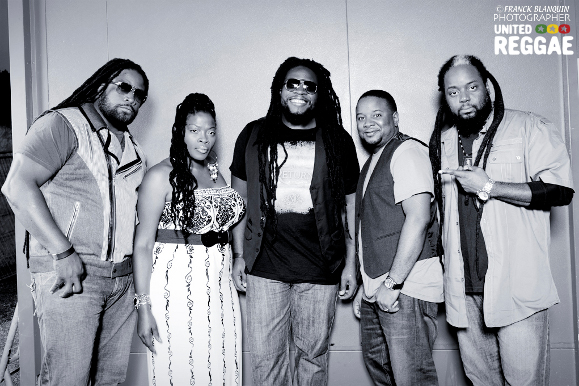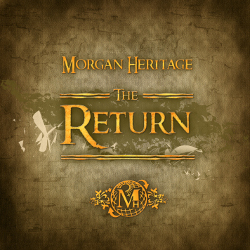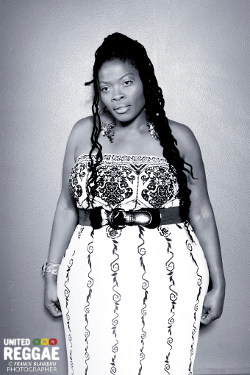Articles about reggae music, reviews, interviews, reports and more...
Interview: Morgan Heritage, The Return
- Home
- Articles
- Interviews
- Interview: Morgan Heritage, The Return

Interview: Morgan Heritage, The Return
"Sometimes you have to take a step back to take two steps forward"
Sampler
In 2009 United Reggae interviewed Gramps of Morgan Heritage during the group's hiatus to pursue solo careers. He dismissed and assuaged any fears on the part of fans that he and his siblings Peter, Mojo, Lukes and Una had parted permanently saying "God is working in mysterious ways but the group is not broken up. We’re just doing some solo albums." His words were confirmed in March when the band announced the release of their first single in five years The Return, produced by Shane Brown, promising a European tour and an album in 2013. Now, Morgan Heritage have dropped a five track taster EP bearing the same name. Angus Taylor caught up with Mojo and Una in London after a triumphant performance in honour of their regrouping and 50 years of Jamaican Independence, where they broadcast Usain Bolt's 100 metres win live into the venue. Here is what they had to say about the new songs, their time off, the historic concert, Una's hidden talents and the resemblance between the logo for their latest release and a certain film franchise...

So, 50 years of independence, the Olympics, the return of Morgan Heritage... how many landmarks is it possible to have in one summer? Did it feel strange to be away from Jamaica for the actual independence day?
MOJO: We're just happy to be invited to play a part in this monumental moment. We didn't plan this. We planned to come back with a studio album until 2013 and that's still the plan. But certain opportunities presented themselves and we're here and we're glad! At this time of year we're not normally in Jamaica. This is a touring season and we're normally on the go so it wasn't strange at all.
You've released a taster EP for the Return. What stage have you reached with the album?
MOJO: It's in the final stages. We've narrowed down the songs we want to finalize for the record. We selected these songs because they represent our core fan base - what made Morgan Heritage who we are today - from the Rastaman movement with the Nyabhingi sounds to the lovers rock community and of course the roots.
 The roots is the essence of who were are as humanity
The roots is the essence of who were are as humanity
The EP tracks Stand Up and the Return itself make some strong statements about what is lacking and what is needed in Jamaican culture. What inspired you to write these words?
UNA: There were several things we were thinking about. It's similar to the inspiration for Tell Me How Come. The return of roots and culture is not as literal as the words say but it has a lot to do with one's mindset. Life is a balance - it's a Yin and Yang - and you have to be able to balance it between physical, spiritual and mental. The roots is the essence of who were are as humanity and we mustn't lose focus on that or we become as wind easily blown away by the next hot thing. Stand Up Brothers and Sisters is preaching unity to understand where we are. Jamaica has been able to provide some serious global international impact - as simple as reggae music and sports. It's just pointing us in the right direction to be proud, stand up for what we've been blessed with and continue to chant on in the world that we live in today.
 You've also chosen to cover Paul McCartney and Michael Jackson's The Girl Is Mine. Michael has a long history of being covered in Jamaican music. Why was the time right to reinterpret this song?
You've also chosen to cover Paul McCartney and Michael Jackson's The Girl Is Mine. Michael has a long history of being covered in Jamaican music. Why was the time right to reinterpret this song?
UNA: Michael is one of our greatest influences. Not only as a vocalist and a performer who will probably go down in history as the greatest entertainer of all time - but also as a humanitarian. We find great honour and pride in using him as an example in the way that he always cared about the next man. He's a major influence on us, especially vocally. There are a lot of R&B influences that make up the Morgan Heritage sound as you hear it today.
The Morgan Heritage sound seems to assimilate such a diverse range of influences. Is there any kind of music where you would definitively draw the line as a group and say "That's not welcome in what we do?"
(laughter)
MOJO: The beautiful thing about being a group is that we are five different minds, five different personalities with five different things that we like and don't like. That's what makes us have such a wide variety. A solo artist will say "I like this and this". Una likes jazz and R&B, I like classical, instrumentals, rock'n'roll, Lukes loves lovers rock and dancehall, Peter loves hip-hop, Gramps loves country and now has an affection for dance music. That's what makes us have the ability to be so...
UNA: Diverse.
 We are five different minds, five different personalities with five different things that we like and don't like
We are five different minds, five different personalities with five different things that we like and don't like
At your concert at the Indigo2, quite apart from celebrating 50 years of Independence and your Return, you made history by stopping the show half way through to screen Usain Bolt and Johan Blake take Olympic gold and silver in the 100 metre finals. Who came up with that?
MOJO: Between us and our nephews and our crew we were all fans of the track and field team from Jamaica and we were just expressing our disappointment at not being able to see the 100 metre final because our performance dropped right in the middle of the race. We were just discussing it all day and decided that was what we wanted so we just spoke to the promoter and the timing of it worked out well.
Was there an element of risk involved? Could you have made it such an unforgettable night if the result had been different? Or were you so sure Bolt would win that it never crossed your minds?
MOJO: We were just sure we wanted to see the race! (laughing)
UNA: That's what we were sure of! (laughing)
MOJO: How it played out was just great because the atmosphere was like we were at the Olympic stadium! The roar of the crowd - some of it from the TV and some of it from the venue - it was just beautiful. We knew it was either going to be Johan Blake or Usain Bolt. We had the confidence that either way Jamaica was going to come out on top! (laughing)
Una, at your show in London, Peter reminded everyone that although it was the first time Morgan Heritage had played there in five years, for you it was more like seven years because of your time out. How did it feel to be back here?
UNA: It was heart-warming. It was humbling. It was an ecstatic time seeing a lot of old faces that I haven't seen in the last six or seven years. And to perform on stage with my brother in London... the last time was at the Astoria [now closed down] so to come back on the 50th anniversary with Shaggy and with Raging Fyah was a great honour. And to witness Usain Bolt while on stage together with all who attended the concert... that feeling will never be repeated. It will stay in history forever.
 To witness Usain Bolt while on stage together... It will stay in history forever
To witness Usain Bolt while on stage together... It will stay in history forever
On stage Peter and Gramps felt the need to explain about the different between reggae and dancehall to the people. On their behalf, why do you think this was so important?
MOJO: It's the 50th year of Independence so it's important for Jamaica to understand what we have as Jamaican people. And what we have is bigger than just reggae - we have reggae AND dancehall. Like hip hop came from R&B, dancehall came from reggae. We need people to be clear on that. That way, each genre of music from our island gets its individual just dues.
UNA: Absolutely.
MOJO: Not one big bowl of rice and peas, you understand?
I ask because there have been some criticisms of that Respect Jamaica festival for not representing the more modern side of dancehall music.
MOJO: Yeah I think there should have been at least one or two nights of dancehall artists. I would agree with those people that I would have liked to see that. Because when you talk about Jamaica it's not just mento, ska, calypso, rocksteady, lovers rock and roots - you have to talk about dancehall! Dancehall brings Jamaica to certain places that roots reggae did not. When you talk about the success of Shabba Ranks, Supercat, Buju Banton in the mainstream. When you see acts like Bounty Killer working with a group like No Doubt going over to a pop rock audience, Sean Paul, Shaggy, Damian Junior Gong Marley - those are all dancehall artists.
You mentioned Buju and The Lord's Prayer was sung on stage in his honour. Stephen Marley and Tarrus also sang his music during the concert series.
MOJO: He is the voice of Jamaica. Buju connects with Jamaican people in a way that many before and after him has or shall. So it's important for us because we are friends, we are brothers from another mother and we have shared a lot of time together. Especially Gramps and Buju. That relationship extends to the rest of the family so it means a lot to us to let people know that he is OK and when him forward we want everyone to be ready.
Gramps has been deejaying a lot recently, on stage, on his latest solo album and now on the Girl Is Mine on the EP. Has a monster been created?
 UNA: Hahaha!
UNA: Hahaha!
MOJO: You know Una actually deejays too! You're going to get that on her solo album that's coming real soon.
UNA: Absolutely!
MOJO: Gramps has been deejaying since we were signed to MCA back in 1992. That's why he says "Them never know singer Gramps could a deejay! Pick up the microphone like Shaggy same way". That's why! Because it's something he hasn't put on the forefront because he's been more focussed on singing.
UNA: That's a part of the whole individuality of the solo projects. We were able to bring forth a lot of that stuff that has been in us that the Morgan Heritage audience today has yet to see. It's just a fun process doing these solo albums to see how we have grown over the last five years!
In an earlier interview this year for another magazine I asked Gramps about what he got up to during your hiatus aside from his solo career and he told me how he reconnected with his American Football playing which was a big part of his life. What did you guys get up to outside of music during that time?
MOJO: For me it was about being able to spend more time with the family. Getting to see and enjoy those moments. The first step, the first word - that's really important in life. And with our younger kids we didn't get to enjoy those things. So it's really a joy to say I was able to see that.
UNA: It was the same thing for me because I just had a baby girl. For the sons I had I missed out on a lot of their younger years and for my daughter I didn't want that. I also had a lot of self exploration and time for myself that I never had before. It was great just exploring Una! So it's been a great period and it's making us a stronger Morgan Heritage today.
You're off to France after this interview. Your father Denroy Morgan had a vision while in France that led to the hiatus and the return...
MOJO: As Gramps said many times, our dad saw the individual talent within the group when he put us together as children as a collective body. And he just saw that our individuality needed a chance to take the forefront. The only way for that to happen was for all of us to have solo careers - especially the four vocalists in the group. But Lukes is also focussed on his solo project - the group's business and his own booking agency.
UNA: I think doing those things has given us a lot of time to be able to soul search and to develop our craft even more. But we have been blessed with a father that gave us everything we needed - all the necessary tools to develop our craft to where we had it. This time it was put on ourselves to do that on a Morgan Heritage record vocally. Before myself Peter and Gramps sang together with Peter as the lead. On our solo records we did everything ourselves so now we're back in the studio we're able to add more ideas, more riffs, more harmonies, because we've developed so much on our own. They say sometimes you have to take a step back to take two steps forward - that's how we look at our growth during the hiatus.
Gramps' nephew Jemere came on stage at Indigo2. You also had the Marleys, the Ellises, the Hibberts, the Romeos, all showcasing the next generation.
MOJO: It's just something that feels natural because if your parent is a doctor you're going to want to be a doctor. In other parts of the world in entertainment you have the Douglas family.
UNA: You have the Sheens.
MOJO: I don't think it's anything special to Jamaica. It's just entertainment: children seeing what their parents do and wanting to follow in their footsteps.
 We're huge fans of Lord Of The Rings and The Return is our Precious!
We're huge fans of Lord Of The Rings and The Return is our Precious!
I already asked Gramps about this in an interview earlier in the year but... final question... the logo for The Return looks like Lord Of The Rings. Are you fans of Lord Of The Rings?
(laughter)
UNA: Yes we are!
MOJO: Yes, we are fans of Lord Of The Rings. We're huge fans and The Return is our Precious!
Read more about this topic
Read comments (3)
| Posted by beve sinclair on 08.28.2012 | |
| Thanks for a wonderful interview.....I've always been a fan of Morgan Heritage....Una showed her spiritual side and made me feel so proud of the group. | |
| Posted by The Wagners on 11.11.2012 | |
| So good the hear that Morgan Heritage is performining together again. Our ultimate dream is to see you in concert in Jamaica. | |
| Posted by The Alfreds on 11.12.2012 | |
| Agree with The Wagners, seeing you in concert in Jamaica would be wonderful. | |
Comments actually desactivated due to too much spams
Browse by categories
Recommended Articles
Latest articles
Recently addedView all
© 2007-2025 United Reggae. All Rights Reserved. Reproduction in whole or in part is prohibited. Read about copyright
Terms of use | About us | Contact us | Authors | Newsletter | A-Z














